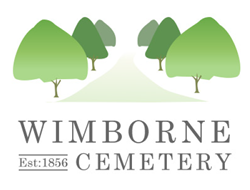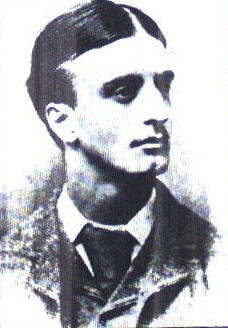
Montague John Druitt
Born 15th August 1857 Died 4th December 1888
Aged 31 Years
Section 8, to west of Chapel.
Montague Druitt was the second son of William Druitt, Wimborne’s leading surgeon. The Druitt’s lived at Westfield House which still stands today. Educated at Winchester and Oxford, he became a barrister on the Western Circuit and Winchester Sessions. The Jack the Ripper murders are some of the most infamous in the history of crime; they were never solved and countless books have been written about them. Sir Melville MacNaughten of Scotland Yard was alleged to be convinced Druitt was the Ripper and on a confidential memo says, “he was sexually insane and from private information I have little doubt but that his own family believed him to have been the murderer.” Druitt’s mother died incurably insane and Druitt drowned himself in the Thames shortly after the last murder. Believed to be the murderer, the police considered the Ripper case closed after Druitt’s suicide and the dreadful killings perpetrated by “Jack the Ripper” were never repeated beyond Druitt’s death. Was this coincidence or conjecture?
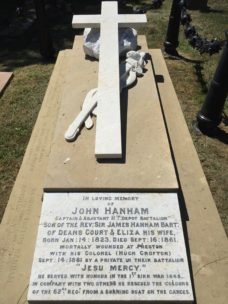
Capt. John Hanham
Born 14th January 1823 Died 16th September 1861
Aged 37 years
Section 8
Captain John Hanham was killed by a single bullet at Fulwood Barracks, Preston in Lancashire in September 1861. According to a contemporary report, Capt Hanham and the commanding officer of the Fulwood depot, Col Hugh Crofton, were walking across the barracks square when a shot was fired, causing both to stagger and fall. The bullet shot from a rifle by Private Patrick McCaffrey, aged 19, passed right through the lungs of Col. Crofton, the chest of Capt. Hanham where it lodged in his back – upon extractions the bullet was found to be quite flat. Col. Crofton died instantly and Capt. Hanham a few days later. Private Patrick McCaffrey, aged 19, was arrested and it quickly came to light that his target had been Capt. Hanham with a motive to avenge the “considerable punishment” the officer had imposed on him. Private McCaffrey was convicted of murder having been said to show no remorse, stating he only intended to kill Capt. Hanham, but the death of Col. Crofton did not matter – he was publicly hanged outside Kirkdale Jail, Liverpool in January 1862.
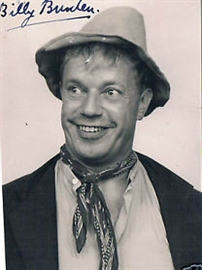
Billy Burden – Wimborne’s Mr Laughter
Born 15th June 1914 Died 8th June 1994
Aged 79 Years
Section 21 J.14
Inscription: ‘Tis a long walk from Dorset’
Billy Burden’s theatrical life began at the Salisbury Playhouse when he responded to an advertisement in The Stage. After a series of comedy roles he appeared in Jack and the Beanstalk where he played Simple Simon as a country bumpkin – this was the turning point. The celebrated impresario Clarkson Rose invited him to create a stand up comic from the character. For the next forty years that innocent rustic figure with the endless stock of often endearingly self-deprecating stories enabled Billy Burden to become almost a fixture on BBC’s “Workers Playtime” and to carve a notable career in pantomime.
Billy worked with all the leading performers during the post war years – Max Miller, Rob Wilton, Harry Secombe, Ken Dodd and Frankie Howard were amongst his friends. His career took on a new lease of life in the early nineties when David Croft and Jeremy Lloyd, creators of such series as “Dad’s Army” and “Are you being Served” devised a new comedy format in “Grace and Favour” in which a part was specially written for Billy that enabled him to work again with John Inman and Wendy Richards.
The son of a council linesman Ernest Burden and Elizabeth Burden, he lived in Wimborne all his life and has entertained millions, including the Queen Mother at a Royal Command Performance in the 1960’s. He is remembered particularly for is oft repeated one liner: “Tiz a long walk from Darzet”
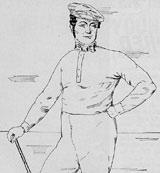
Nicholas Wanostrocht
Born 5th October 1804 Died 3rd September 1876
Aged 71 years
Section 8, near to Chapel
Nicholas Wanostrocht (aka N Felix) was born in 1804 and was a celebrity cricketer of the generation before WG Grace. He was an excellent left-handed bat and invented cricketing equipment such as batting gloves and ‘longitudinal socks’ of linen filled with strips of rubber, worn under the trousers, later to become pads. He sold his patent to the ball and equipment maker to Duke & Sons in 1848. Wanostrocht also invented the automatic bowling machine, The Catapulta, as well as finding time to write an illustrated book on cricket called Felix on the Bat.
Following his retirement to Brighton, Wanostrocht moved to Wimborne in 1872 with his second wife. He had had a long association with Wimborne visiting many times as early as 1840 and on one occasion allegedly almost drowned in a local river! Despite deteriorating health, he still took an interest in cricket and in a field next to his house 1 Julian Villas (now 23 Julian’s Road) he coached the local boys. Nicholas Wanostrocht died in Wimborne on 7th September 1876 and is buried in Wimborne Cemetery in Section 8, near to the Chapel.
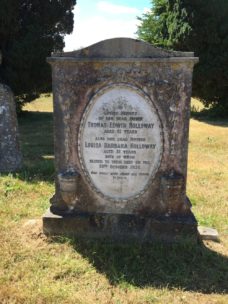
Thomas and Barbara Holloway
Born 1869 and 1879 (respectively) Died 20th October 1930
Aged 61 and 51 Years
Section 4 consecrated
On the morning of Monday the 20th October 1930, Thomas Edwin and Louisa ‘Barbara’ Holloway were shot dead in their bedroom at Watsford Farm House near Wimborne.
Earlier that year the marriage of the Holloway’s 19-year-old daughter, Trixie to a 55-year-old Capt. Frank Burdett took place causing upset because of the huge age difference and a summons for abduction was taken out against him, but later withdrawn. Thomas Holloway and Capt. Burdett had not spoken to each other since the marriage, but Barbara Holloway helped him several times for Trixie’s sake, giving him £18 on one occasion, no small amount in those days.
The exact reason behind the murders is unknown as Capt. Burdett proceeded to take his own life, leaving a note to Trixie, saying “The time has come to end everything. I am going to do away with myself. I leave everything to my wife.” He was found in a hedge about 100 yards away with terrible wounds to his face and a gun by his side – he later died. He was also buried in Wimborne Cemetery but not before a dramatic interception by the Clerk to the Burial Board A. G Taylor, who ran towards the vicar and funeral director shouting ‘You are aware of the verdict at the inquest. This man was a suicide and can’t be buried in Consecrated Ground’. After digging a new grave in a neglected corner of the Cemetery, Capt. Burdett was interred into an unmarked grave.
The inquest on all three deaths concluded that Capt. Frank Burdett had ‘wilfully murdered’ the Holloway’s and that his death was recorded as ‘suicide’.
